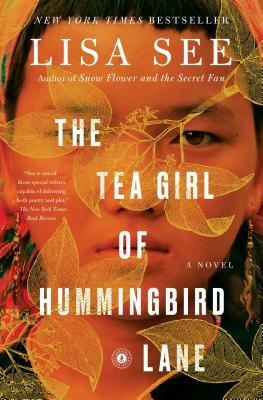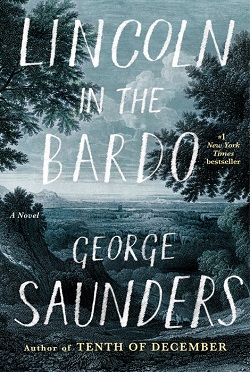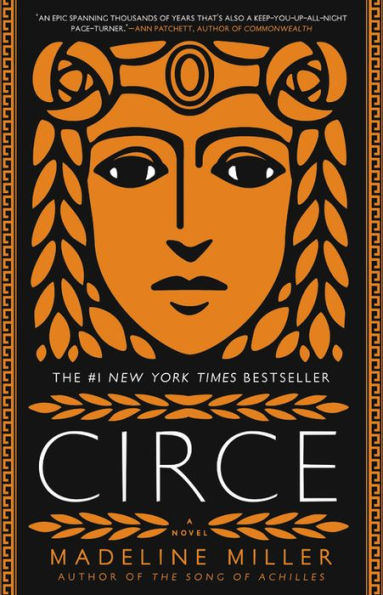We’ve all been on the train before, book in hand, only to look up and realize that we’ve missed—or nearly missed—our stop. These are books that draw you into their worlds, books with entrancing atmospheres and captivating writing that make you completely lose track of time. Some of them are thrillers, others historical fiction or nonfiction with unique topics. Here are the books we’ve recently picked up and could not put back down, even when we needed to.

7 Books So Compelling We Almost Missed Our Train Stops
This book has to be one of my favorites that I read in the past year. I was absolutely captivated by the characters and, whenever I was reading it, I just felt completely drawn in to the story. I found that there were a lot of moments that had me on the edge of my seat or instances where I absolutely HAD to know what was going to happen. I can’t even tell you how often I lost track of time and space and yes, I missed my train stop. The writing was so beautiful and perfectly detailed that it was easy to believe that I was in this setting, experiencing everything alongside characters that I had gotten to know and love.
—Danielle
MENTIONED IN:
It’s pretty hard for me to miss my train or bus stop, because it’s almost always at the beginning or end of the line, but I’ve definitely had some books where I wished I could just wait for the train to turn itself around and keep going. The most memorable of these was LINCOLN IN THE BARDO. I got to my stop about twenty pages from the end and immediately rushed to get to my office so I could finish it. This novel, told in a script format, is bizarre and incredible. It follows the death of Abraham Lincoln’s son, Willie, taking place over the course of one night and told from the point-of-view of the residents of a graveyard, all of whom have yet to pass onto the other side. What commences is a struggle for the fate of Willie’s soul. It’s truly an extraordinary book, and I hope it makes you miss your stop too.
— Erin
George Saunders is an acclaimed short story writer of collections THE TENTH OF DECEMBER, PASTORALIA, and more. His first novel, LINCOLN IN THE BARDO, is a mesmerizing blend of historical fact and fiction. It is the story of the death of Abraham Lincoln’s son, Willie, told almost entirely through the voices of the spirits in the graveyard where Willie is laid to rest and where Lincoln returns to hold his son’s body. —Erin
This coming-of-age memoir moves at a breathless pace, slipping through scenes of Jones’s adolescence and young adult years in Texas and Kentucky. I read it all in one sitting—the voice is honest and hauntingly vulnerable, the series of personal essays a compulsive portrayal of complicated relationships and what it was like to grow up black and gay in the South. HOW WE FIGHT FOR OUR LIVES encompasses moments of grief, love, and power as it is defined by America and redefined by those on the margins. Jones is a poet, and it shows in his stunning, gripping prose that will certainly do its best to make you miss your train stop.
— Johanna
WINNER OF THE 2019 KIRKUS PRIZE IN NONFICTION
WINNER OF THE 2020 STONEWALL BOOK AWARD-ISRAEL FISHMAN NONFICTION AWARD
ONE OF THE NEW YORK TIMES’S 100 NOTABLE BOOKS OF 2019
One of the best books of the year as selected by The Washington Post; NPR; Time; The New Yorker; O, The Oprah Magazine; Harper’s Bazaar; Elle; Kirkus Reviews; Publishers Weekly; BuzzFeed; Goodreads; School Library Journal; and many more.
“A moving, bracingly honest memoir that reads like fevered poetry.” —The New York Times Book Review
“Jones’s voice and sensibility are so distinct that he turns one of the oldest of literary genres inside out and upside down.” —NPR’S Fresh Air
“People don’t just happen,” writes Saeed Jones. “We sacrifice former versions of ourselves. We sacrifice the people who dared to raise us. The ‘I’ it seems doesn’t exist until we are able to say, ‘I am no longer yours.’”
Haunted and haunting, How We Fight for Our Lives is a stunning coming-of-age memoir. Jones tells the story of a young, black, gay man from the South as he fights to carve out a place for himself, within his family, within his country, within his own hopes, desires, and fears. Through a series of vignettes that chart a course across the American landscape, Jones draws readers into his boyhood and adolescence—into tumultuous relationships with his family, into passing flings with lovers, friends, and strangers. Each piece builds into a larger examination of race and queerness, power and vulnerability, love and grief: a portrait of what we all do for one another—and to one another—as we fight to become ourselves.
An award-winning poet, Jones has developed a style that’s as beautiful as it is powerful—a voice that’s by turns a river, a blues, and a nightscape set ablaze. How We Fight for Our Lives is a one-of-a-kind memoir and a book that cements Saeed Jones as an essential writer for our time.
MENTIONED IN:
CIRCE is, without a doubt, one of my top five favorite books of all time. I absolutely could not put it down and ended up reading it everywhere—in the bathroom at social events, under my desk at work (sorry, boss) and on the subway, where it made me miss my stop more than once. It is the story of Circe, who you may remember as the sorceress who turned men into pigs in THE ODYSSEY. But here, Madeline Miller makes Circe the heroine of her own story. This is her epic tale of finding herself as a witch, a mother, and a lover; it is a coming-of-age story that spans thousands of years. It’s rare to find a book where every single female character feels fully explored and real, as if they are flesh-and-blood people jumping off the page, but this book does it all and more. I have never felt more seen by a book or been left feeling more empowered and inspired as a woman. It’s a journey well worth being late to get to wherever you’re going.
— Sarah Jane
MENTIONED IN:
As a history nerd, a New York native, and a hypochondriac, David M. Oshinsky’s Bellevue was—for me—quite literally unputdownable. This is normally a great thing in a book . . . except when you’re on the subway and too engrossed to realize you got on the wrong train. An exhaustive and expertly written biography of New York City’s flagship public hospital, it explores everything from its beginnings as an almshouse to its crucial work during the AIDS crisis and beyond.
— Kerry
On Kerry’s wish list
Few things interest me as much as New York City’s history and with a nurse for a sister, it’s only natural that I would be intrigued by New York City’s iconic hospital. From being the home of the nation’s first nursing school to becoming a metonym for all psychiatric hospitals, Bellevue obviously has a storied history—and it’s one that I have little knowledge of, even though it remains an essential place for patients in New York City today. David Oshinsky won a Pulitzer Prize for his last non-fiction work, POLIO, and I have no doubt that BELLEVUE will be fascinating, evocative, and beautifully written.
Lisa Jewell’s writing keeps you on the edge of your seat, and I’m not sure how I didn’t completely fall off mine when my train jolted to a stop at my station. When the book opens, the only thing you know is that someone has been murdered, but Jewell does not reveal who died, or who did the killing. I spent the entire novel trying to figure out both. With characters that are obsessive, stalker-like, and self-destructive, this novel was almost impossible to step away from.
— Hannah
MENTIONED IN:
Already convinced of Carole Johnstone’s storytelling chops after devouring her debut, MIRRORLAND, I was ready to become fully immersed in THE BLACKHOUSE once I started reading. What I was not ready for was a one-way ticket to the Scottish isles as Johnstone hurls readers on to the Outer Hebrides with mesmeric descriptions of the violent sea, the desolate farmlands, and the tight-lipped townspeople. Inside this atmospheric novel, we meet Maggie, in her mid-twenties, still haunted by when she infamously claimed (at the age of five years old) to be the reincarnation of a man murdered on the remote island of Kilmeray. Visiting the island, set on solving this mystery, she isn’t well received by a local community still carrying resentment for her unfounded claims. But the truth resides on the island and an “outsider” named Robert, seeking to escape his own dark secrets, may be the missing piece of the puzzle. Narrated by both Maggie and Robert, often in different timelines, I was completely locked in to this story, waiting for the other shoe to drop. I was not disappointed—and you won’t be either—because Johnstone’s conclusion truly pays off. Cancel your plans and plant yourself on the couch, THE BLACKHOUSE is all the entertainment you need.
—Chris
From the author of the “dark and devious...beautifully written” (Stephen King) Mirrorland comes a richly atmospheric thriller set on an isolated Scottish island where nothing is as it seems and shocking twists lie around every corner.
A remote village. A deadly secret. An outsider who knows the truth.
Robert Reid moved his family to Scotland’s Outer Hebrides in the 1990s, driven by hope, craving safety and community, and hiding a terrible secret. But despite his best efforts to fit in, Robert is always seen as an outsider. And as the legendary and violent Hebridean storms rage around him, he begins to unravel, believing his fate on the remote island of Kilmeray cannot be escaped.
For her entire life, Maggie MacKay has sensed something was wrong with her. When Maggie was five years old, she announced that a man on Kilmeray—a place she’d never visited—had been murdered. Her unfounded claim drew media attention and turned the locals against each other, creating rifts that never mended.
Nearly twenty years later, Maggie is determined to find out what really happened, and what the islanders are hiding. But when she begins to receive ominous threats, Maggie is forced to consider how much she is willing to risk to discover the horrifying truth.
Unnerving, enthralling, and filled with gothic suspense, The Blackhouse is a spectacularly sinister tale readers won’t soon forget.
MENTIONED IN:
Photo Credit: LorenzoPatoia/iStock


















